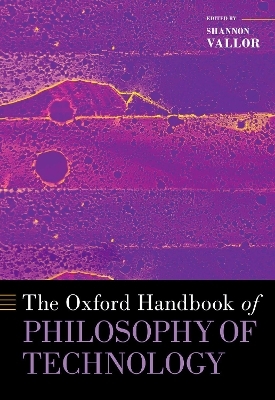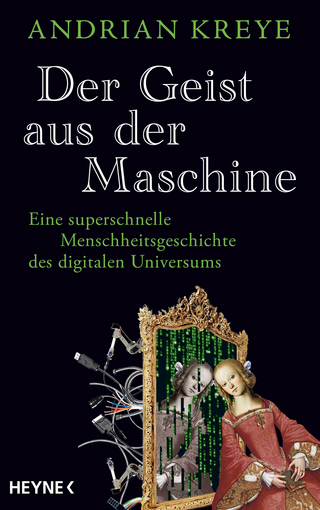
The Oxford Handbook of Philosophy of Technology
Oxford University Press Inc (Verlag)
978-0-19-085118-7 (ISBN)
The chapters reveal enduring conceptual themes concerning technology's role in the shaping of human knowledge, identity, power, values, and freedom, while bringing a philosophical lens to the profound transformations of our existence brought by innovations ranging from biotechnology and nuclear engineering to artificial intelligence, virtual reality, and robotics. This new collection challenges the reader with provocative and original insights on the history, concepts, problems, and questions to be brought to bear upon humanity's complex and evolving relationship to technology.
Shannon Vallor is the Baillie Gifford Chair in the Ethics of Data and Artificial Intelligence at the Edinburgh Futures Institute (EFI) at the University of Edinburgh, where she is also appointed in Philosophy. Professor Vallor's research explores how new technologies, especially AI, robotics, and data science, reshape human moral character, habits, and practices. She regularly advises policymakers and industry on the ethical design and use of AI. In addition to her many articles on the ethics of new technologies, she is the author of Technology and the Virtues: A Philosophical Guide to a Future Worth Wanting (Oxford University Press, 2016). In 2015 she received the World Technology Award in Ethics from the World Technology Network.
Introduction: Introducing the Philosophy of Technology (Shannon Vallor, ed.)
Part I: Histories and Methodologies in the Philosophy of Technology
Chapter 2 What Is Living and What Is Dead in Classic European Philosophy of Technology? (Carl Mitcham)
Chapter 3 The Empirical Turn (Peter-Paul Verbeek)
Chapter 4 Philosophy of Technology and the Continental and Analytic Traditions (Maarten Franssen)
Chapter 5 Whence and W(h)ither Technology Ethics (Don Howard)
Part II: Technology and Epistemology
Chapter 6 Styles of Objectivity in Scientific Instrumentation (A.S. Aurora Hoel)
Chapter 7 Engineering Knowledge (Wybo Houkes and Anthonie Meijers)
Chapter 8 The Epistemic Role of Technical Functions (Beth Preston)
Chapter 9 Revisiting Smartness in the Smart City (Sage Cammers-Goodwin)
Part III: Technology, Power, and Politics
Chapter 10 Philosophy of Technology as Politics (Adam Briggle)
Chapter 11 Postcolonialism and Technologies of Identification (Alison Adam)
Chapter 12 Rawls, Information Technology, and the Sociotechnical Bases of Self-Respect (Anna Lauren Hoffmann)
Chapter 13 Freedom in an Age of Algogracy (John Danaher)
Chapter 14 (Bio)technology, Identity, and the Other (Anna Gotlib)
Part IV: Technology, Metaphysics, and Language
Chapter 15 The Technological Uncanny as a Permanent Dimension of Selfhood (Ciano Aydin)
Chapter 16 Technology and the Ontology of the Virtual (Massimo Durante)
Chapter 17 Using Philosophy of Language in Philosophy of Technology (Mark Coeckelbergh)
Chapter 18 What Is It Like to Be a Bot? (D.E. Wittkower)
Chapter 19 Technological Multistability and the Trouble with the Things Themselves (Robert Rosenberger)
Part V: Technology, Aesthetics, and Design
Chapter 20 Understanding Engineering Design and Its Social, Political and Moral Dimensions (Philip Brey)
Chapter 21 Virtual Reality Media and Aesthetics (Grant Tavinor)
Chapter 22 Evaluation, Validation, and Management in Design (Pieter E. Vermaas)
Chapter 23 Urban Aesthetics and Technology (Sanna Lehtinen)
Part VI: Technology, Health and the Environment
Chapter 24 Science Fiction Futures and (Re)visions of the Anthropocene (Julia D. Gibson and Kyle Powys Whyte)
Chapter 25 A Framework for Thawing Value Conflicts in the GMO Debate (Samantha Noll)
Chapter 26 The Minded Body in Technology and Disability (Ashley Shew)
Chapter 27 Outer Space as a New Frontier for Technology Ethics (Keith Abney)
Part VII: Technology and the Good Life
Chapter 28 Technology, Cognitive Enhancement, and Virtue Ethics (Barbro Fröding)
Chapter 29 Toward an Existential and Emancipatory Ethic of Technology (Charles Ess)
Chapter 30 Why Confucianism Matters for the Ethics of Technology (Pak-Hang Wong)
Chapter 31 Care Ethics, Philosophy of Technology, and Robots in Humanitarian Action (Aimee van Wynsberghe)
Chapter 32 Reflections on Promises and Perils Thinking for Emerging Technologies (Deborah G. Johnson)
| Erscheinungsdatum | 14.02.2022 |
|---|---|
| Reihe/Serie | Oxford Handbooks |
| Zusatzinfo | 10 halftones |
| Verlagsort | New York |
| Sprache | englisch |
| Maße | 239 x 175 mm |
| Gewicht | 1315 g |
| Themenwelt | Geschichte ► Teilgebiete der Geschichte ► Technikgeschichte |
| Geisteswissenschaften ► Philosophie ► Allgemeines / Lexika | |
| Geisteswissenschaften ► Philosophie ► Ethik | |
| Mathematik / Informatik ► Informatik | |
| ISBN-10 | 0-19-085118-X / 019085118X |
| ISBN-13 | 978-0-19-085118-7 / 9780190851187 |
| Zustand | Neuware |
| Informationen gemäß Produktsicherheitsverordnung (GPSR) | |
| Haben Sie eine Frage zum Produkt? |
aus dem Bereich


